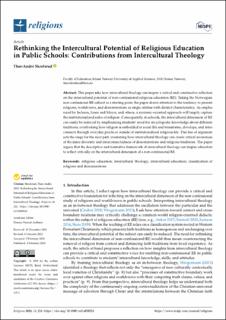Rethinking the Intercultural Potential of Religious Education in Public Schools: Contributions from Intercultural Theology
Peer reviewed, Journal article
Published version
Permanent lenke
https://hdl.handle.net/11250/3120504Utgivelsesdato
2023Metadata
Vis full innførselSamlinger
Originalversjon
10.3390/rel14020224Sammendrag
This paper asks how intercultural theology can inspire a critical and constructive reflection on the intercultural potential of non-confessional religious education (RE). Taking the Norwegian non-confessional RE subject as a starting point, the paper draws attention to the tendency to present religions, worldviews, and denominations as single entities with distinct characteristics. As emphasized by Jackson, Jones and Meyer, and others, a systemic-oriented approach will largely capture the institutionalized sides of religion. Consequently, in schools, the intercultural dimension of RE can easily be reduced by emphasizing students’ need for encyclopedic knowledge about different traditions, overlooking how religion is embedded in social life and transforms, develops, and interconnects through everyday practices outside of institutionalized religious life. This line of argument sets the stage for the next part, examining how intercultural theology can create critical awareness of the inner diversity and interconnectedness of denominations and religious traditions. The paper argues that the descriptive and normative framework of intercultural theology can inspire educators to reflect critically on the intercultural dimension of a non-confessional RE Rethinking the Intercultural Potential of Religious Education in Public Schools: Contributions from Intercultural Theology
Beskrivelse
This article is an open access article
distributed under the terms and
conditions of the Creative Commons
Attribution (CC BY) license (https://
creativecommons.org/licenses/by/
4.0/).

